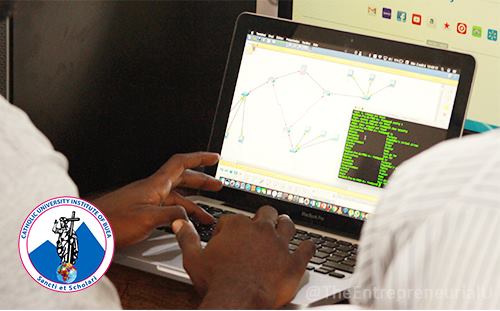Amid Escalating Coronavirus outbreak, CUIB reassures parents and students that learning will not stop
The Catholic University Institute of Buea, the Growth Mindset Entrepreneurial University, is one of the leading universities in Africa that had adopted a hybrid model of teaching and learning, consisting of onsite and online delivery, long before the Coronavirus outbreak.
Being one of the first entrepreneurial universities in Africa, the institution’s management has always strived to keep the university at an international level, institutionalizing standards that globalize the students.
CUIB has never stopped seeking new ways to adapt to the changing educational landscape around the world. Under the leadership of Rev. Fr. George Nkeze, the management insisted on a university-wide digitalization of the teaching and learning processes of the institution. Faculty, staff, and students are trained regularly on adapting to new and innovative technologies for eLearning.
The deadly coronavirus has caused many governments around the world to take drastic measures towards containment, including the closure of borders, schools, bars and restaurants, the banning of gatherings and church services amongst others.
The Growth Mindset Entrepreneurial University, CUIB, had long invested in eLearning prior to the outbreak and thus finds itself better prepared than most institutions to guarantee continuity to its students and parents. CUIB embarked on this journey as a result of the Anglophone crisis which had led to the shutdown of many schools in the South West Region. To ensure that learning continued uninterrupted for its students, the University adopted a ubiquitous delivery model – permitting students to learn anywhere, anytime. Although the new model was the result of dealing with the consequences of the civil unrest in the region, it kept CUIB at the forefront nationally and in line with other universities abroad that had recognized the added value to complementing on-site learning with online activities. This ubiquitous hybrid model of teaching and learning made it possible for CUIB to rise above the effects of Anglophone crisis with the frequent lockdowns and “ghost town” days which disrupted on-site classes in Buea.
CUIB’s vision is that “teaching and learning never ends”, no matter the circumstances.
CUIB fully launched the Hybrid Ubiquitous Teaching and Learning model in a press conference that was chaired by the President/Pro-Chancellor Rev. Fr. George Nkeze in 2018. In articulating why CUIB was adopting the Hybrid Ubiquitous Teaching approach, Rev. Fr. George Nkeze explained to the Press that the Hybrid Ubiquitous Teaching and Learning is in line to meet up with the changing landscape of education, where many universities are bringing in new technology to reach out to their students around the world. With Hybrid Ubiquitous Teaching and Learning, the students can come to class when the atmosphere is safe and can stay at home and get their lessons with their lecturers in times of instability.
Rev. Fr. George also explained that the students could now use the gadgets like cell phones, laptops, tablets etc. that are usually a distraction as resource materials where they can advance towards their educational goals.
The current crisis resulting from the virus outbreak has infected over 500,000 and killed over 24,000 around the world with 75 reported cases of infection and one death in Cameroon. As a result, the government of Cameroon shut down all schools to contain the virus.
The big question now is what will become of learning? Will learning also stop? And what if the crisis worsens and students have to stay home for 4-5 months? How will they be educated? Will CUIB stop learning?
These are the questions being asked by parents, stakeholders and some officials.
The government shutdown of Schools amid coronavirus outbreak will not affect the learning process of CUIB
CUIB has good news for its parents, stakeholders and students that learning will not stop in CUIB amid the outbreak of the coronavirus. CUIB has complied with the government’s instructions to close its doors physically. However, they remain open to their students virtually as prescribed by the Minister of Higher Education, Professor Jacques Fame Ndongo in the press release of March 20th, 2020 calling on the “mobilization of information and communication technologies to continue online training activities thanks to the digital tools available to the students, such as the social media and in particular institutional digital platforms for online teaching.” With a state-of-the-art institutionalized digital platform already in use by the students, both as a web application and a mobile app, CUIB students are guaranteed to continue learning anytime, anywhere! CUIB’s collaboration with other members of international catholic organizations – the International Federation of Catholic Universities (IFCU) and the Association of Catholic Colleges and Universities (ACCU) have contributed greatly to the eLearning endeavour. Some faculty and staff travelled abroad to these universities to expand their knowledge on the process returning to improve on the applications and enrich the delivery. The customized eLearning platforms meet the aspirations of the faculty, staff and students. A strong support team is always available to address any challenges that they encounter.


